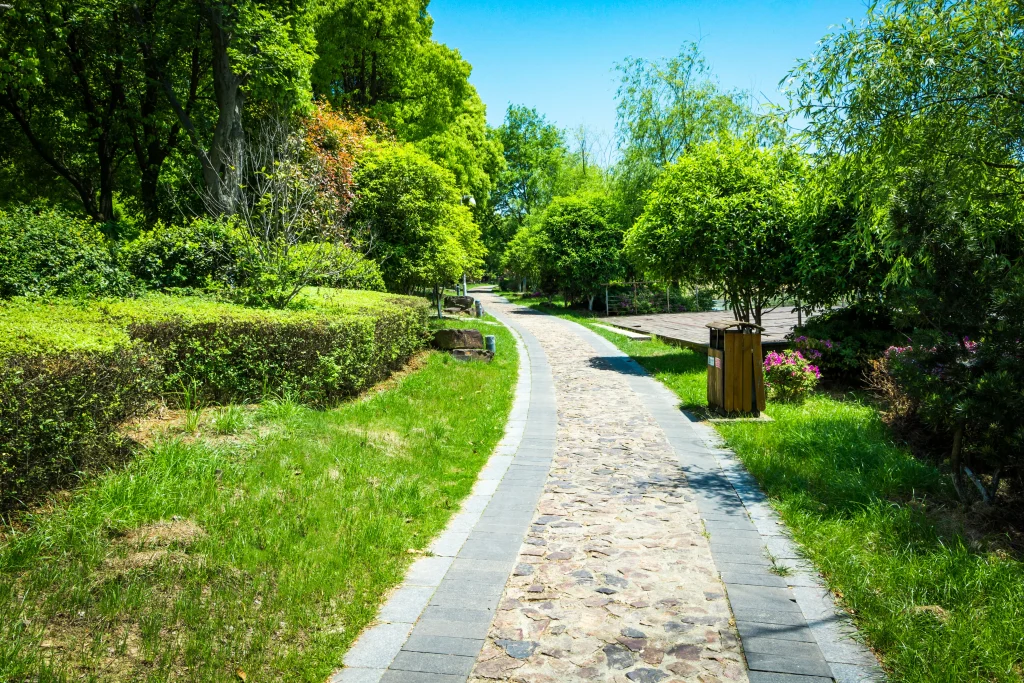How much does sod installation cost? Installing sod costs between $0.5 and $4 per square foot depending on the size of your yard, the quality of the soil, and other factors (the sod itself, labor, and other materials). Get a free quote for sod installation!
At Mile High Lifescape, we understand that homeowners want transparency about what sod installation really costs before making this investment.
This guide breaks down the true cost of sod installation in Denver, helping you decide between DIY and professional options while maximizing your investment in a healthy, vibrant lawn.
Average Sod Installation Cost in Denver (2026 Estimate)
The cost to install sod in Denver varies based on several factors, including whether you choose DIY or professional installation:
| Installation Type | Cost Per Square Foot | Total Cost for 2,000 Sq Ft Lawn |
| DIY Installation | $0.50–$1.50 | $1,000–$3,000 |
| Professional Installation | $1.50–$4.00 | $3,000–$8,000 |
These estimates include the sod material, delivery fees, labor costs, ground preparation, and other related expenses.
Professional installation costs more but includes proper soil preparation, expert placement, and often a guarantee – factors that significantly impact the long-term success of your lawn.
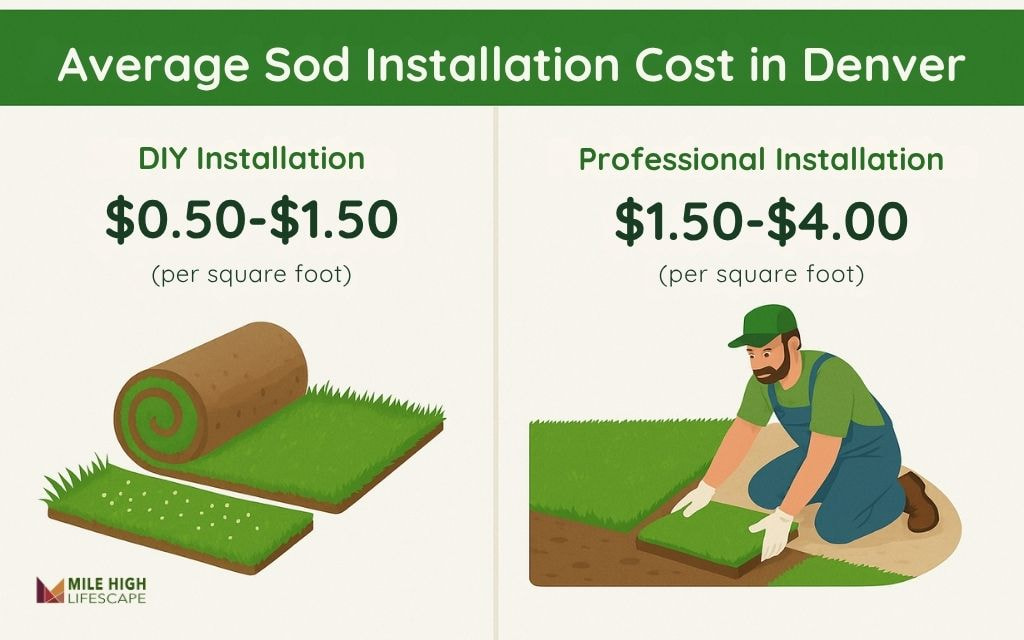
Sod Installation Cost by Lawn Type
Denver’s unique climate requires grass varieties that can handle our conditions.
The price of sod varies by type:
| Lawn Type | Cost per Sq Ft | Notes |
| Kentucky Bluegrass | $0.30–$0.50 | Cool-season, traditional choice |
| Tall Fescue | $0.40–$0.60 | Drought-tolerant, durable roots |
| Fine Fescue | $0.40–$0.65 | Good for shady areas |
| Buffalo Grass | $0.60–$1.00 | Native, very low water requirement |
- Kentucky Bluegrass remains popular in Denver despite its higher water needs because of its lush appearance and resilience to foot traffic.
- Buffalo Grass costs more initially but saves on water bills long-term, making it increasingly popular among environmentally conscious homeowners.
Sod Installation Cost by Lawn Size
The total cost scales with square footage, though many suppliers offer volume discounts for larger orders:
| Lawn Size | Estimated Total Cost |
| 500 sq ft | $750–$1,500 |
| 1,000 sq ft | $1,500–$3,000 |
| 2,000 sq ft | $3,000–$6,000 |
| 5,000+ sq ft | $7,000+ |
To measure your lawn accurately, use satellite mapping tools like Google Earth’s measurement feature, or download a property measurement app. Precise measurements prevent ordering too much or too little sod, both of which increase your costs.
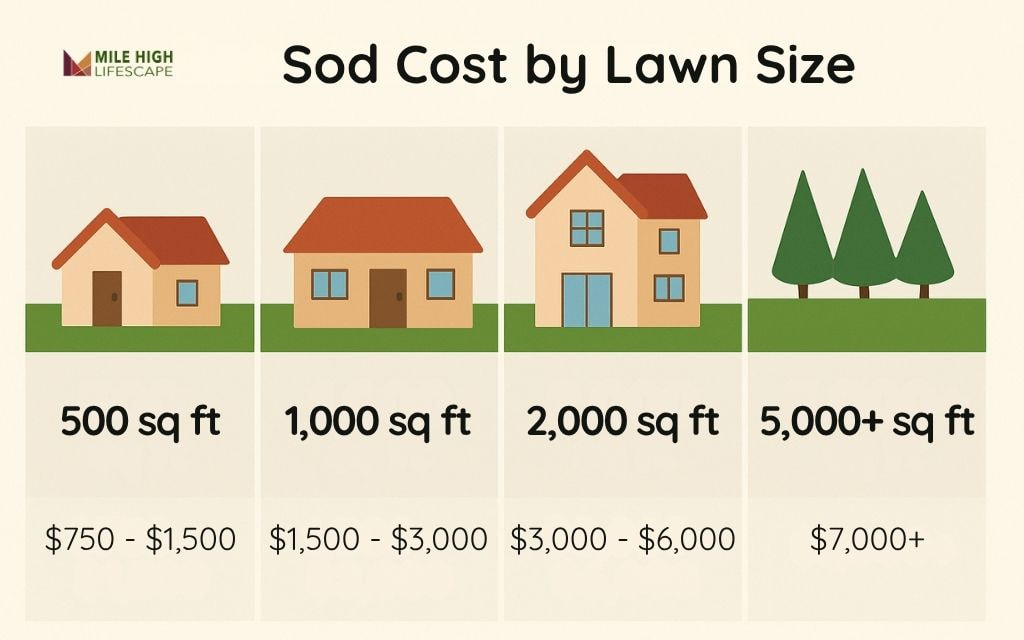
Labor Cost for Laying Sod
Professional installation labor in Denver averages between $1.00 – $2.50 per square foot. This includes:
- Unrolling and laying sod with proper seam alignment
- Initial watering to establish root contact
- Light soil smoothing and fitment around obstacles
- Edge trimming and perimeter finishing
Many contractors offer comprehensive packages that bundle preparation, materials, and installation. These packages typically provide better value than piecing together separate services, especially for standard-sized lawns.
Sod Cost by Shape and Access to Area
The configuration of your yard significantly impacts installation costs:
Complex yards with irregular shapes, curved borders, or numerous obstacles require more cutting, fitting, and labor time. Expect to pay 15-25% more for yards with intricate designs or multiple flowerbeds and trees to work around.
Limited access adds another layer of complexity. Yards that contractors cannot directly access with equipment may incur surcharges of 10-30%.
Common access challenges include:
- Narrow gates or passages that prevent equipment access
- Steep slopes or multiple elevation changes
- Fenced yards with no direct vehicle entry
- Properties with stairs between access points and installation areas
For properties with challenging access, sod often must be transported manually, significantly increasing labor time and cost.
Sod Delivery Fees
Most sod suppliers in Denver charge separate delivery fees:
- Local delivery (under 15 miles): $75–$100
- Extended delivery (15–30 miles): $100–$175
- Remote areas (30+ miles): $175–$250+
To minimize delivery costs:
- Schedule delivery during the supplier’s standard routes
- Combine orders with neighbors to split delivery fees
- Order all materials (sod, soil, compost) from the same supplier
- Plan for weekday rather than weekend delivery
Most suppliers require a minimum order, typically 500 square feet (about 5 pallets), to qualify for delivery.
Sod Ground Prep Cost
Proper ground preparation determines whether your sod thrives or struggles. This critical step accounts for a significant portion of professional installation costs:
- Old lawn/vegetation removal: $0.50–$1.00 per square foot
- Soil rototilling and aeration: $100–$300 for average-sized lawns
- Premium topsoil addition: $30–$60 per cubic yard (typically 1 cubic yard covers 100-150 sq ft at 2″ depth)
- Grading and leveling: $500–$1,500 depending on existing slopes and drainage issues
For Denver’s clay-heavy soils, we recommend adding a soil test ($50–$100) to identify specific amendments needed. Our region’s alkaline soils often require sulfur or peat moss to balance pH levels before sod installation.
Skipping proper preparation saves money upfront but often leads to patchy growth, poor root establishment, and ultimately, the need to replace sections of sod – costing more in the long run.
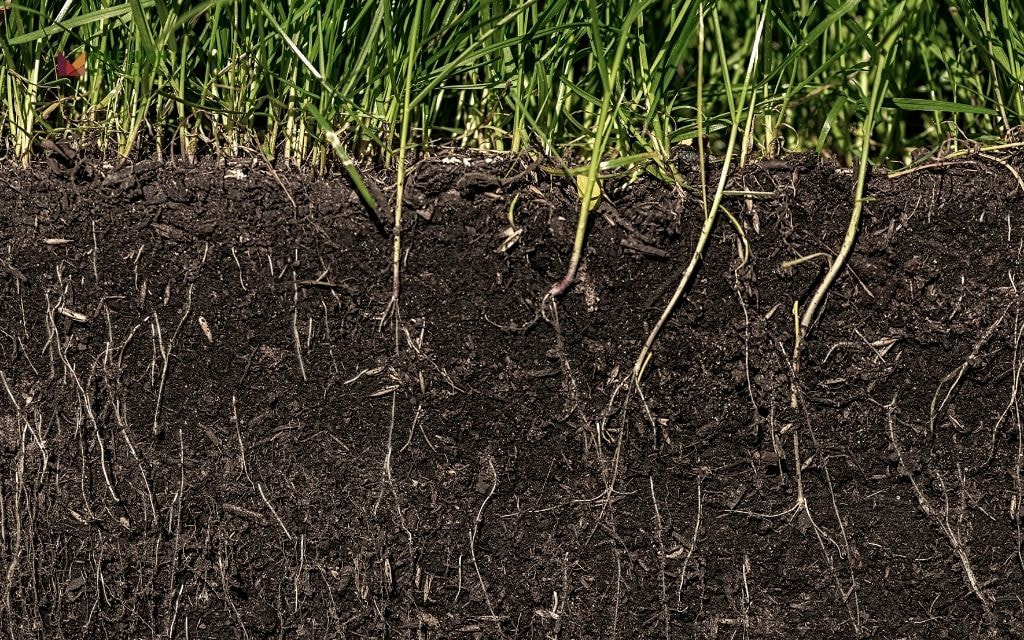
DIY vs. Professional Sod Installation Cost
| Factor | DIY Installation | Professional Installation |
| Total Cost | $0.50-$1.50 per sq ft ($1,000-$3,000 for 2,000 sq ft lawn) | $1.50-$4.00 per sq ft ($3,000-$8,000 for 2,000 sq ft lawn) |
| Equipment Expenses | $250-$850 for tools and supplies (rollers, cutters, edgers) | Included in professional pricing |
| Soil Testing | $12-$30 per sample (DIY kit) | Professional testing typically $60-$100 |
| Labor Time | 2-3 days for average lawn (1-2 hours per 500 sq ft) | Usually completed in 1 day |
| Ground Preparation | Limited ability to properly grade/level | Expert soil preparation included |
| Quality Assurance | No guarantees | 30-90 day warranty typical |
| Warranty Coverage | None | Protection against installation defects |
When DIY Makes Sense:
DIY sod installation can save 40-60% in upfront costs, making it appealing for budget-conscious homeowners. This approach works best for:
- Small lawns under 1,000 sq ft with flat terrain
- Homeowners with previous landscaping experience
- Properties with good existing soil quality
- Flexible timelines without urgent completion needs
- Availability of help for heavy lifting (each pallet weighs 1,500-2,500 pounds)
When Professional Installation Is Worth It:
According to 2026 data from Denver contractors, professional installation becomes increasingly cost-effective as lawn size increases. The value proposition improves when:
- Your lawn exceeds 1,000 sq ft (labor savings offset higher rates)
- Your property has slopes, drainage issues, or complex shapes
- Your soil requires significant amendment or grading
- You need guaranteed results with warranty protection
- Your time is valuable (professionals install 500 sq ft in 1-1.5 hours)
How to Save on Sod Installation Cost in Denver?
Reduce your sod installation costs with these strategies:
- Install sod during ideal seasons (April-May or September) when demand is lower
- Remove the old lawn yourself before professionals arrive
- Order sod collaboratively with neighbors to share delivery costs
- Request thinned-out sod rolls (contractors can sometimes stretch coverage)
- Consider sod only for high-visibility areas, using seed for less visible sections
- Prepare the site yourself, then hire professionals only for the final installation
- Request end-of-day or end-of-week pricing when suppliers may discount remaining inventory
- Compare quotes from at least three local suppliers and installers
Many Denver landscapers offer early-season discounts of 10-15% to secure business before the peak summer season.
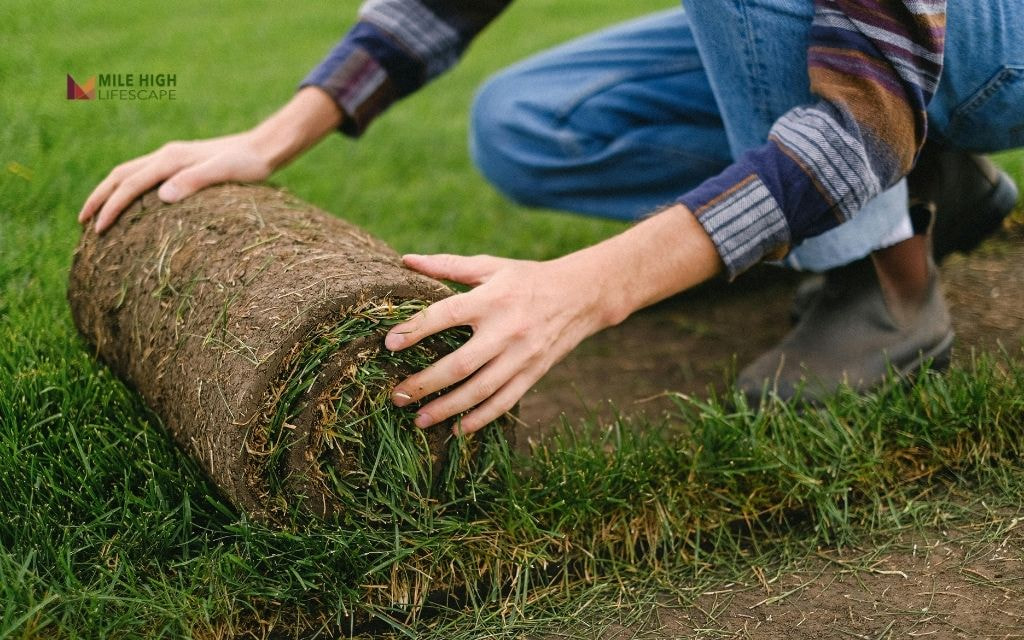
Conclusion
The cost of sod installation represents more than just immediate gratification – it’s an investment in your property’s value and outdoor enjoyment. While seeding costs less initially, sod provides immediate results, reduces erosion concerns, and establishes more quickly in Denver’s challenging climate.
Key cost factors include sod variety, lawn size, ground preparation requirements, and installation method. Professional installation from Mile High Lifescape ensures proper preparation, expert placement, and ongoing support for your new lawn.
Contact us for a customized quote that addresses your specific Denver property conditions and lawn goals.
Frequently Asked Questions (FAQs)
u003cspan style=u0022font-weight: 400;u0022u003eHow much is 1,000 square feet of sod?u003c/spanu003e
u003cspan style=u0022font-weight: 400;u0022u003eThe cost to lay 1,000 square feet of sod ranges from $1,500 to $3,000 for professional installation in Denver. This includes the sod material ($300-$600), delivery ($75-$100), preparation ($600-$1,200), and installation labor ($500-$1,000). DIY installation for the same area would cost approximately $850-$1,500.u003c/spanu003e
u003cspan style=u0022font-weight: 400;u0022u003eHow much is 500 square feet of sod?u003c/spanu003e
u003cspan style=u0022font-weight: 400;u0022u003eThe cost to lay 500 square feet of sod ranges from $750 to $1,500 for professional installation in Denver. This includes the sod material ($150-$300), delivery ($75-$100), preparation ($300-$600), and installation labor ($250-$500). DIY installation would cost approximately $425-$750, but note that delivery minimums may apply.u003c/spanu003e
u003cspan style=u0022font-weight: 400;u0022u003eHow do I estimate sod installation cost?u003c/spanu003e
u003cspan style=u0022font-weight: 400;u0022u003eTo calculate how many pieces of sod you need, measure the total area (length x width in square feet) and divide by 2.75 (the square footage of a standard sod piece). Add 5-10% extra for waste and cutting. For budget purposes, multiply your square footage by $1.50-$4.00 for professional installation or $0.50-$1.50 for DIY installation.u003c/spanu003e
u003cspan style=u0022font-weight: 400;u0022u003eHow much does it cost to install sod?u003c/spanu003e
u003cspan style=u0022font-weight: 400;u0022u003eSod installation costs an average of $2,062 in Denver, with most homeowners paying between $1,075 and $3,049. A 500-square-foot yard might cost as little as $750, while a 2,000-square-foot yard could cost more than $6,000 for professional installation with premium sod varieties and significant site preparation.u003c/spanu003e
u003cspan style=u0022font-weight: 400;u0022u003eWhat is the best month to lay sod in Denver?u003c/spanu003e
u003cspan style=u0022font-weight: 400;u0022u003eEarly to mid-fall (September-October) provides ideal conditions for laying sod in Denver, as cooler temperatures reduce water requirements while the grass continues to establish roots. Early spring (April-May) ranks as the second-best time, allowing roots to establish before summer heat.u003c/spanu003e
